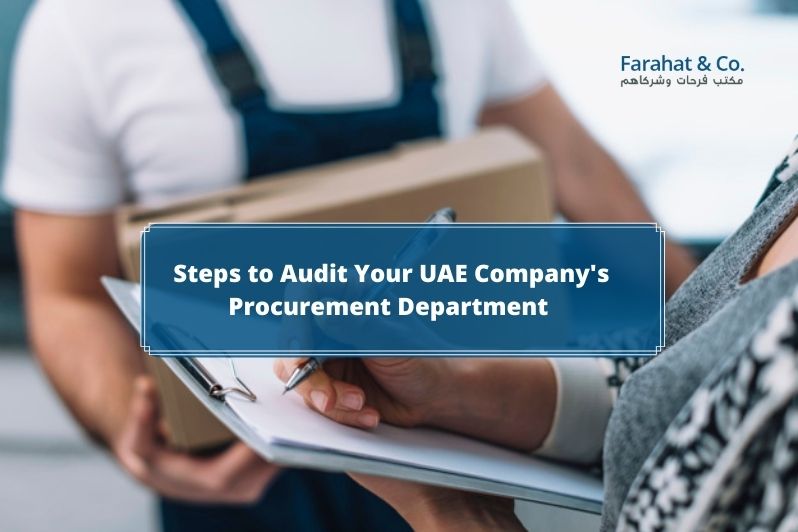Procurement audits in UAE provide companies with unprecedented visibility with their expenditures, resulting in better management of the companies’ whole expenditure portfolio. Procurement can include items such as:
- Professional services
- Office technology and office products
- Janitorial, sanitation, and cleaning supplies
- Lab supplies
- Safety and electrical gear
- Paper, shredding, and document management processes
- Workplace furniture
- Maintenance, operation, and repair of service reliant or non-production situations
- Company transportation and travel in service related or non-production situations
When implemented properly by reliable, experienced audit firms in UAE, procurement audits can create long-term savings in costs for business organizations operating in the country. The long-term strategic savings, however, don’t happen overnight. Through tracked, measured, and incremental recommendations, a business can trim its procedures and processes surrounding expenditures without disrupting service or product deliverables.
While procurement audit processes in UAE can vary, greatly depending on the industry and organization, they generally consist of the following primary stages:
- Review of company purchases
- Evaluation of the company vendors
- Review of purchase allocation uses and processes
- Reporting of findings and making recommendations
Let’s now look more closely at the steps to audit your UAE company’s procurement department.
Review of Purchases
Review of purchases of a company is the foundational step in which a procurement audit is carried out. A comprehensive review of the company’s purchases can be a huge, daunting task. Performing one for your business in UAE often means aggregating, finding, and manually examining years' worth of purchase orders and looking out for a lot of things. This includes:
- Accurate vendor information
- Proper authorization signatures
- Accurate product quantities, descriptions, and pricing
- Accurate inventory information
- Matching final invoices
- Details cross checked with bills of sale and packing lists
At a minimum, a business in UAE tends to review a sample purchase order that dates back from the previous fiscal year. It is not uncommon for a purchase review stage to a procurement audit in UAE to cover bills of sale, purchase orders, and invoices for over several years. There are even procurement audits in the UAE that involve the review of transactions from decades past, most especially when the processes of the company are concerning.
Evaluation of Vendors
The next step to a procurement department audit in UAE is reviewing vendors of the company. This includes the organizations and suppliers that have been selected by the organization to conduct business through written contracts. There are a lot of spending variables an audit team will be taking into account. This includes the following:
- Credit programs
- Pricing rebates
- Percentage rates and taxation charges
- Cash discounts and/or trade discounts
- Contractual errors
- Freight, delivery, and transportation practices
- Quantity discounts
- Vague contract language
- Poor industry reputation
- Overall differentiation of cost and price with other vendors that offer similar or the same services
The evaluation of vendors is a particularly crucial part of an audit for a procurement department as it can reveal discounts, discrepancies, and deals your organization was not privy to. There may even be ones that your business did not detect on its radar. With an auditing firm in UAE conducting a procurement audit, your business will be able to utilize vendor history information and databases that can secure this particular knowledge. You'll get accurate and in-depth insights into vendors and select suppliers that offer the best amenities and programs at the best rates. All these while you mitigate any possible compliance concerns of vendors.
Review of Purchase Allocation Uses and Procedures
Procurement audits in the UAE can take a close look at a company’s internal purchasing operations. Contrary to popular belief, this goes beyond legal paperwork. It will reveal how leadership and employees are actually conducting purchasing operations for your business and if they are doing so efficiently, cost-effectively, and strategically.
The exact procurement patterns and habits of your team will be different from another company's. This is because there are differences in the kinds of services and materials that are procured. With the performance of an internal purchasing review, you will be able to reveal the most critical expenditure information, including:
- Advantages and disadvantages of the company’s existing purchasing workflows
- Chains of command for approving purchase orders
- Employee involvement and access in ordering supplies
- Employee involvement and access for making purchase requests for services
- Existence of receiving final accounts payable documents and checklists
- Use of an approved list of suppliers to place orders with for the company
- Authorized signatures that are on invoice approvals and purchasing orders
6 Things You Should Prepare for Your Auditor Before an Initial Audit
Reporting of Findings and Making Recommendations
The final step to auditing a company’s procurement department in UAE involves delivering recommendations in order to correct procurement actions. The recommendations will be tailored to the purchasing effectiveness of a company in the long term. Recommendations will be targeted to save business costs in the long haul.
If you want a procurement audit in UAE that will end up your organization knowing its expenditures better for a more sustainable and secure overhead future, call us here in Farahat & Co!


